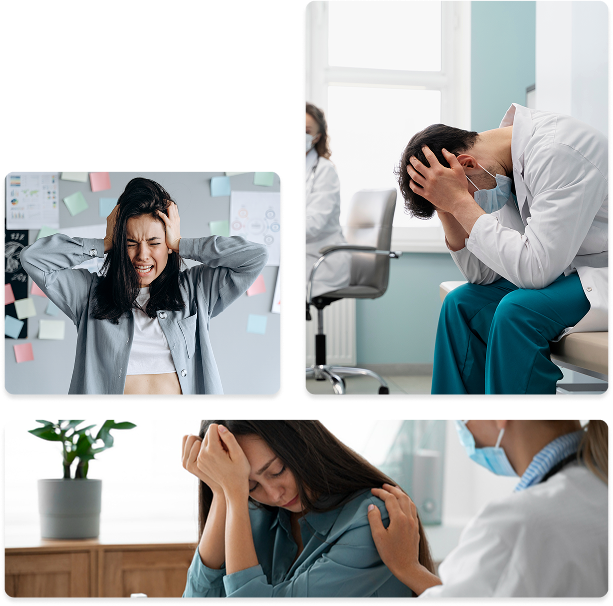What Is Acupuncture?
Acupuncture is a Traditional Oriental method used to relieve symptoms of disease, such as pain. An acupuncturist inserts very thin steel needles into your skin at multiple “acupoints.” No-Needle Acupuncture uses a unique system to stimulate acupoints without breaking the skin.
What does acupuncture treat?
Acupuncture (No Needle) treats the patient, not conditions. For this reason, multiple health conditions may improve at the same time such as:
Arthritis
- Back pain, neck pain or muscle pain.
- Headaches and migraines.
- Knee pain
- Menstrual cramps.
- Sports injuries.
- Face pain and other nerve discomfort.
Other health conditions acupuncture may help include:
- Cancer and cancer treatment side effects.
- Immune system problems.
- Infertility.
- Irritable bowel syndrome (IBS).
- Menopause and hot flashes.
- Pregnancy discomforts.
- Repetitive strain disorders and overuse syndrome.

Are there different types of acupuncture?
There are hundreds of different types of acupuncture: TCM, Five Elements, Microsystems, Sports and more. There is also “dry needling”, which is not acupuncture, but focuses on individual muscle groups to help with myofascial pain. Our style represents a combination of seven systems.
Acupuncture FAQ
What is auricular acupuncture?
Auricular acupuncture is on the auricle (ear). There are over 200 small points inside the ear that represent different organs and tissues in the body. Most auricular acupuncture or auriculotherapy is done for mental/emotional stress relief.
How does acupuncture work?
Chinese medicine calls the energy that flows through your body qi. Chinese medicine practitioners believe qi disruptions create imbalances in your body’s energy that lead to illness.
Some forms of acupuncture aim to rebalance qi with needles that touch acupuncture points (acupoints) throughout your body. There are hundreds of acupoints in your body along 14 major meridians, also called energy-carrying channels.
What happens during an acupuncture treatment?
Needles may feel prickly. Sometimes, needles may cause some muscle sensations, such as dull aches or tingling. Since we don’t use needles, you don’t need to worry about feeling pain from them. The number one reason most people don’t get acupuncture is because they are afraid of needles! Have no fear when you visit Charlotte Acu Bodywork!
Does acupuncture hurt?
Auricular acupuncture is on the auricle (ear). There are over 200 small points inside the ear that represent different organs and tissues in the body. Most auricular acupuncture or auriculotherapy is done for mental/emotional stress relief.
What happens after an acupuncture treatment?
Auricular acupuncture is on the auricle (ear). There are over 200 small points inside the ear that represent different organs and tissues in the body. Most auricular acupuncture or auriculotherapy is done for mental/emotional stress relief.
What are the benefits of acupuncture?
Acupuncture benefits include relief from long-term (chronic) pain and other health conditions. Many people use acupuncture to relieve pain throughout their body, including for migraines, back pain and arthritis. Studies have also shown that acupuncture may be a successful treatment option for a variety of conditions, including immune system issues, infertility and the effects of menopause.
What are the risks or complications of acupuncture?
Most risks come from unqualified practitioners mishandling needles. With our no-needle system, we have eliminated that risk in our clinic.
How often should I get treatments?
The number of treatments depends on your condition, its severity and how your body responds. Most people have an appointment once a week. Others get treatment more or less often, depending on how long the effects last. Your practitioner will recommend a schedule that’s right for you.
You may not get the full benefits of acupuncture on the first or second treatment. If you decide to try acupuncture, you should give it at least five treatments.
Will I need any other treatments besides acupuncture?
If you need medical care, please consult with your physician. In most cases, people use acupuncture along with other treatments. For example, someone with chronic pain will likely take medications and also get acupuncture. Someone with cancer would still receive cancer treatment but also use acupuncture. You should continue taking your prescribed medications, no matter how good acupuncture makes you feel.
Dry needling vs. acupuncture – what’s the difference?
Acupuncture is similar to dry needling, but it’s not the same procedure. Both involve the use of needles, but that’s where the similarities end. Acupuncture is based in Eastern medicine, and licensed acupuncturists perform it. Dry needling is based in Western medicine and healthcare providers such as physical therapists perform it. Acupuncture treats musculoskeletal pain and other body systems. Physical therapists usually use dry needling as part of a broader physical therapy approach that includes other treatments.
Are your services covered by insurance?
No needle acupuncture is not covered by insurance at this time. However, if you have an HSA or FSA account, you may use that to pay for services.
